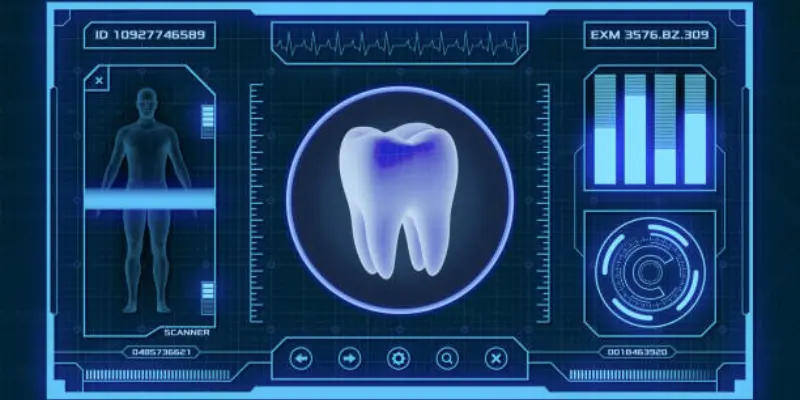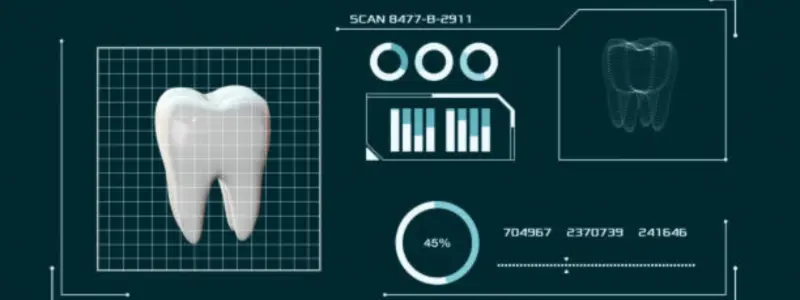Top 10 Best AI Dental Software Tools for Smarter Clinics [2025]
Published: 23 May 2025
Did you know, it is estimated that by 2025, over 70% of dental clinics will use AI software to improve patient care? The best AI dental software helps dentists to find problems faster, plan treatments better and save time. This technology is changing dental care for the better.
But, finding the best AI dental software can be frustrating. You want a tool that’s simple to use, accurate and helps your team save time. Many dental clinics struggle with slow diagnosis or too much paperwork. The right AI software can solve these problems and make your clinic run smoother and smarter.

What Is AI Dental Software?
AI dental software is a smart tool made for dentists and clinics. It uses artificial intelligence to help with everyday work. This means the software can learn, think and make tasks easier without needing help all the time.
In Simple Words:
Think of it like a digital assistant that never gets tired. It can:
- Read dental X-rays and spot problems
- Send reminders to patients
- Write notes after each visit
- Suggest treatment plans based on data
Example:
Dr. Patel runs a busy clinic in Chicago. She started using an AI tool to scan X-rays. Before, it took her 15 minutes per image. Now, the software gives results in just 30 seconds with better accuracy. This helps her treat more patients in less time.
AI doesn’t replace dentists. It just helps them work faster and smarter.
Why AI Matters in Modern Dental Clinics
Dental work is all about precision, speed and care. But with busy schedules and endless tasks, things can get overwhelming. That’s where AI dental software steps in to help.
It doesn’t just save time but also changes how your clinic runs. Let’s look at some of the biggest benefits AI brings to dentistry.
1. Faster Diagnoses
AI scans dental images in seconds. It helps spot cavities, cracks or infections early, so you can treat problems before they get worse.
2. Fewer Missed Appointments
AI tools send smart reminders to patients. This keeps your calendar full and your front desk stress-free.
3. Less Paperwork
AI can write clinical notes, update patient records and even handle billing. That means you get to spend more time with people not on paperwork.
4. Better Patient Experience
Everything runs smoother with AI. Shorter wait times, quick check-ins and clear reports help patients feel more confident and cared for.
Top 10 Best AI Dental Software Tools for 2025
AI dental software is changing how clinics work. These smart tools help dentists save time, improve accuracy and offer better care. Here are the top 10 AI dental software tools in 2025 that can make your clinic smarter and more efficient.
1. Overjet
Overjet uses AI to analyze dental X-rays and images quickly. It highlights problems like cavities, bone loss and other dental issues. It helps dentists make faster and more accurate decisions.
Key Features:
- AI-powered image analysis
- Automated report generation
- Easy integration with existing dental systems
Who Should Use It:
Ideal for clinics wanting fast and precise diagnostics.
Real-Life Example:
A clinic in New York used Overjet and reduced X-ray review time by 60%, catching issues earlier.
2. VideaHealth
VideaHealth provides AI tools to detect dental diseases from images and helps in treatment planning. It’s known for high accuracy and easy user interface.
Key Features:
- AI-based cavity and lesion detection
- Cloud-based platform for easy access
- Detailed visual reports for patients
Who Should Use It:
Perfect for clinics focused on preventive care and patient education.

3. Pearl AI
Pearl AI analyzes dental X-rays and patient data to assist diagnosis and workflow. It also offers practice intelligence tools to improve clinic efficiency.
Key Features:
- Deep learning for image interpretation
- Workflow automation
- Real-time alerts and patient monitoring
Who Should Use It:
Great for busy clinics that want to speed up processes without losing accuracy.
4. Diagnocat
Diagnocat uses AI to analyze dental scans and 3D images. It helps dentists spot hidden issues and create treatment plans faster.
Key Features:
- 3D image analysis
- AI-assisted diagnostic reports
- Seamless integration with imaging devices
Who Should Use It:
Best for clinics using advanced imaging like CBCT scans.
5. Denti.AI
Denti.AI focuses on automating dental charting and note-taking using AI. It can also help with insurance coding and claims.
Key Features:
- Automated clinical note generation
- Insurance claim support
- Voice recognition and dictation
Who Should Use It:
Good for clinics wanting to reduce paperwork and speed up billing.
6. CareStack
CareStack offers cloud-based practice management with AI-powered scheduling, billing and patient communication.
Key Features:
- AI-driven appointment scheduling
- Billing automation
- Patient engagement tools
Who Should Use It:
Ideal for multi location clinics looking for centralized management.
7. Greaten AI
Greaten AI automates administrative tasks such as scheduling, billing and insurance claims using smart AI assistants.
Key Features:
- Automated patient scheduling
- AI claim processing
- Staff workload management
Who Should Use It:
Best for clinics needing support with administrative efficiency.
8. YAPI
YAPI focuses on AI-powered patient communication and digital form management. It helps clinics improve patient flow and engagement.
Key Features:
- Automated reminders and confirmations
- Digital consent forms
- Patient feedback tools
Who Should Use It:
Perfect for clinics wanting smoother patient check-ins and communication.
9. Planmeca Romexis
Planmeca Romexis offers a comprehensive dental imaging platform with built-in AI to enhance image analysis and diagnosis.
Key Features:
- Advanced 3D and 2D imaging
- AI-based image enhancement
- Customizable reporting
Who Should Use It:
Suitable for clinics with high imaging demands and advanced equipment.
10. DEXIS
DEXIS provides digital imaging and AI tools to improve diagnostic accuracy and patient care.
Key Features:
- High-resolution imaging
- AI-assisted diagnostics
- Integration with practice management systems
Who Should Use It:
Great for clinics looking for reliable imaging combined with AI support.
How to Choose the Right AI Dental Software
Picking the best AI dental software can feel overwhelming. But don’t worry! Follow these easy steps to find the perfect fit for your clinic.
Step 1: List What Your Clinic Needs
Write down the tasks you want the software to help with. Do you want faster X-ray analysis? Better scheduling? Or less paperwork? Knowing this helps you focus on tools that match your goals.
Step 2: Set Your Budget
AI tools come in many price ranges. Decide how much you can spend. Remember, the most expensive is not always the best. Look for software that gives good value for your money.
Step 3: Try Free Demos
Many software companies offer free trials or demos. Use these to test how the software works. Check if it’s easy to use and fits your daily routine.
Step 4: Ask About Support and Training
Good software comes with good support. Make sure the company offers training, guides and quick help if you get stuck. This makes learning new software much easier.
Future Trends in AI Dentistry
AI is changing fast and future hospitals will use AI increasingly in their practices. Here are some exciting things coming soon to dental clinics:
1. AI That Predicts Oral Health Issues
Future AI tools will not just spot problems, they will predict them before they start. Imagine your software telling you which patients might get cavities or gum disease soon. This helps dentists act early and keep smiles healthy.
2. Virtual Dental Assistants
Virtual assistants powered by AI, will help with patient questions, appointment scheduling and even follow-ups. These assistants work 24/7, giving clinics more support without extra staff.
3. Smarter Imaging Tools
AI imaging will get even better at reading scans and X-rays. They will find smaller problems faster and give clearer reports. This means dentists can offer more precise treatments.
Conclusion
So guys, in this article, we’ve covered the best AI dental software in detail. If I had to pick one, Overjet stands out for its accuracy and ease of use, making it great for clinics of all sizes. Now it’s your turn, try a demo, see what fits your needs and bring AI into your clinic to improve care and save time!
AI Dental Software FAQs
Here are frequently asked question about AI Software in Dental Care:
AI dental software costs vary widely, from $50-200 per month for basic tools to $500-2000+ monthly for comprehensive platforms. Many providers offer tiered pricing based on clinic size and features needed. Most companies provide custom quotes rather than fixed pricing, so it’s best to contact vendors directly for accurate costs.
Yes, reputable AI dental software companies follow strict HIPAA compliance and use advanced encryption to protect patient data. They store information on secure, certified cloud servers with regular backups and security audits. Always verify that any software you choose is HIPAA-compliant and ask about their specific security measures.
Most AI dental software is designed to be user-friendly and can be learned within 1-2 weeks of regular use. Initial setup and staff training typically takes 2-4 days with vendor support. The software companies usually provide comprehensive training, tutorials and ongoing support to ensure smooth adoption.
Most modern AI dental software is designed to integrate with popular practice management systems and imaging equipment. However, compatibility can vary, so it’s important to check with the software provider about your specific equipment. Many offer integration support or APIs to connect with your current systems.
AI dental software is designed to assist dentists, not replace their professional judgment. Dentists always review and confirm AI findings before making treatment decisions. The AI serves as a second opinion tool to help catch things that might be missed but the final diagnosis and treatment plan always comes from the licensed dentist.
Most AI dental software runs on standard computers and doesn’t require expensive hardware upgrades. Cloud-based solutions work through web browsers and need only a reliable internet connection. Some advanced imaging AI might benefit from faster processors but vendors typically provide minimum system requirements during consultation.
AI dental software is available for practices of all sizes with many solutions specifically designed for small clinics. Smaller practices can start with basic AI tools focused on one area like X-ray analysis rather than comprehensive platforms. Many vendors offer scalable pricing and starter packages for solo practitioners or small group practices.
AI dental software often matches or exceeds human accuracy in detecting common issues like cavities and bone loss, with some studies showing 90%+ accuracy rates. However, AI works best when combined with human expertise rather than replacing it entirely. The technology is constantly improving and learning from more data, making it increasingly reliable over time.
Most AI dental software requires internet connectivity since they run on cloud-based platforms for processing power and data storage. Some systems offer limited offline functionality for basic tasks but full AI features typically need internet access. It’s important to have reliable internet and possibly a backup connection for critical practice operations.
Most patients respond positively to AI in dental care when it’s explained as a tool that helps their dentist provide better, more accurate treatment. Many appreciate faster diagnosis times and clearer visual reports that help them understand their oral health. Transparency about how AI assists (not replaces) the dentist’s expertise helps in building the patient’s confidence and trust.





